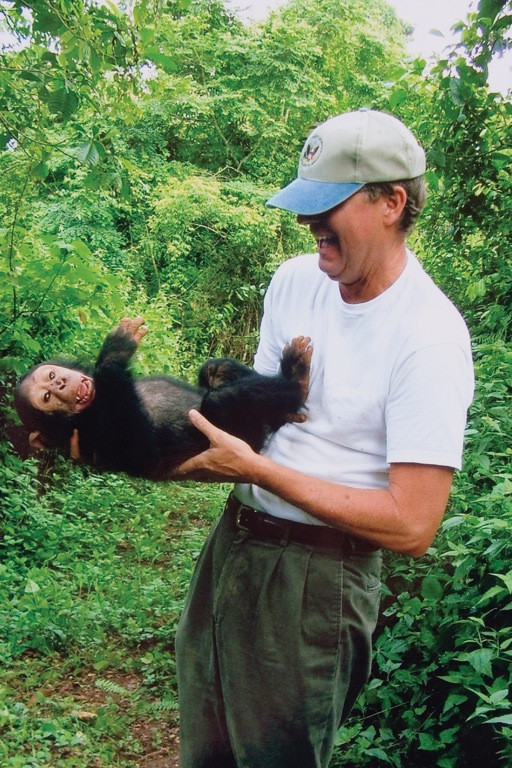Into Africa
Open gallery

In the Mbargue rain forest of remotest Cameroon, Niels Marquardt reaches up to offer a hand to a young chimpanzee climbing on a low branch. Tic, a lively 2-year-old chimp, studies the tall stranger, casually dressed and wearing a baseball cap. The chimp likes what he sees. Tic climbs into his arms–and across his shoulders–and then hangs upside down as Marquardt struggles and laughs. It’s hard to tell who’s having more fun.
Marquardt has traveled the world as a career officer with the U.S. Foreign Service and currently serves as ambassador to Cameroon and neighboring Equatorial Guinea in western Africa.
The San Diego native claims that his life’s journey really started the day he first stepped foot on Lewis & Clark’s campus during a college-scouting trip through the Northwest with friends.
“Really, it all began here,” Marquardt said during a recent campus visit, remarking that Lewis & Clark (and a stint studying abroad in Munich) “opened the world to me.”
He was clearly in a hurry to get places, as he graduated from the College in just three years with a degree in German. After attending Thunderbird, the American Graduate School of International Management, he spent two years in Rwanda with the Peace Corps before joining the Foreign Service. His career as an economics officer sent him to diplomatic posts in Thailand (twice), Congo, France, and Germany.
In 2001, back in Washington, D.C., he took on a massive recruitment drive for the Foreign Service. While recruitment might not seem terribly glamorous, Marquardt welcomed the opportunity to reinvigorate an organization that had lost some of its luster since its Cold War heyday. Under then–Secretary of State Colin Powell’s charismatic leadership, the agency was able to more than quadruple the number of new recruits over a three-year period.
What’s more, the assignment allowed Marquardt to communicate his passion for the work–a career with challenges, but also great rewards for those with a sense of adventure and an appreciation of serendipity.
As ambassador to two African countries, Marquardt juggles a hectic agenda, promoting political and economic ties while fostering democracy (both countries are ruled by presidents who have been in power more than 20 years) and economic self-sufficiency. Both Cameroon (population 17 million) and Equatorial Guinea (half a million people) are developing nations that face widespread poverty and major health issues such as HIV/AIDS.
Marquardt has made the fight against corruption a key priority of his ambassadorship, casting the issue in economic terms.
He tells his countries’ leaders directly that they need to “do something dramatic and sustained about corruption; otherwise foreign investment dollars are going to go elsewhere.”
While some look at Africa and see little but problems, Marquardt sees dramatic potential: abundant natural resources, a fascinating tourist destination, and people who genuinely aspire to great things. But both countries must yet develop their political and social infrastructure to attract the foreign trade that is the key to prosperity. “Countries have a much better chance of transforming themselves with investment dollars than with assistance dollars,” he says.
He is also involved in promoting environmental causes, which was why he visited the Sanaga-Yong Chimpanzee Rescue Center, run by In Defense of Animals–Africa. The organization works to protect wild chimps that are being threatened by a black market trade in bush meat. Marquardt visited the rescue center to highlight the nonprofit’s efforts to save wildlife and habitat. (Coincidentally, Sheri Speede, a veterinarian who formerly practiced near Lewis & Clark’s campus, leads the center.)
Being a U.S. ambassador brings “the power to do good, the power to make a difference, the power to influence” on wide-ranging issues, from promoting democracy to protecting the environment. “You just try to do everything you possibly can.”
Marquardt couldn’t have traveled or accomplished so much without a remarkably supportive family. His wife, Judi, actively promotes children’s and women’s issues, and his four daughters have adapted well to the globetrotting lifestyle. In fact, when his second daughter was given the choice to finish up high school in Virginia or Cameroon, she chose to do her studies abroad. Truly, her father’s daughter.
Because ambassadors typically hold three-year appointments, Marquardt will likely be moving on to a new job in 2007. He can retire, but he plans to stay on for a few more years. Where he’ll go next, he has no idea.
“You don’t know what the next thing is,” he says. “It could be another overseas assignment or something on the domestic front.” As a man clearly having the time of his life, he wouldn’t have it any other way.
–by Romel Hernandez
More L&C Magazine Stories
Lewis & Clark Magazine is located in McAfee on the Undergraduate Campus.
MSC: 19
email magazine@lclark.edu
voice 503-768-7970
fax 503-768-7969
The L&C Magazine staff welcomes letters and emails from readers about topics covered in the magazine. Correspondence must include your name and location and may be edited.
Lewis & Clark Magazine
Lewis & Clark
615 S. Palatine Hill Road MSC 19
Portland OR 97219

